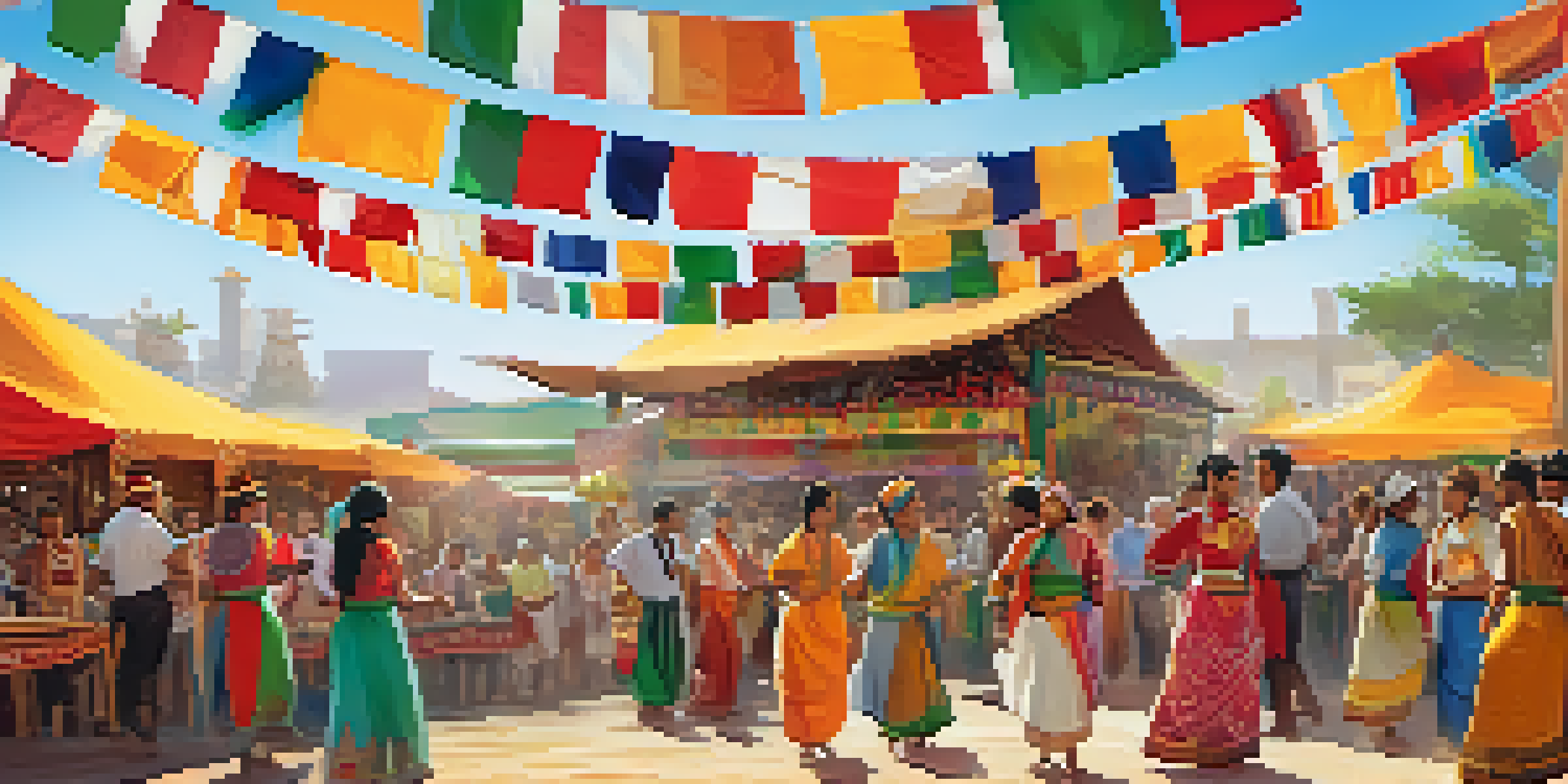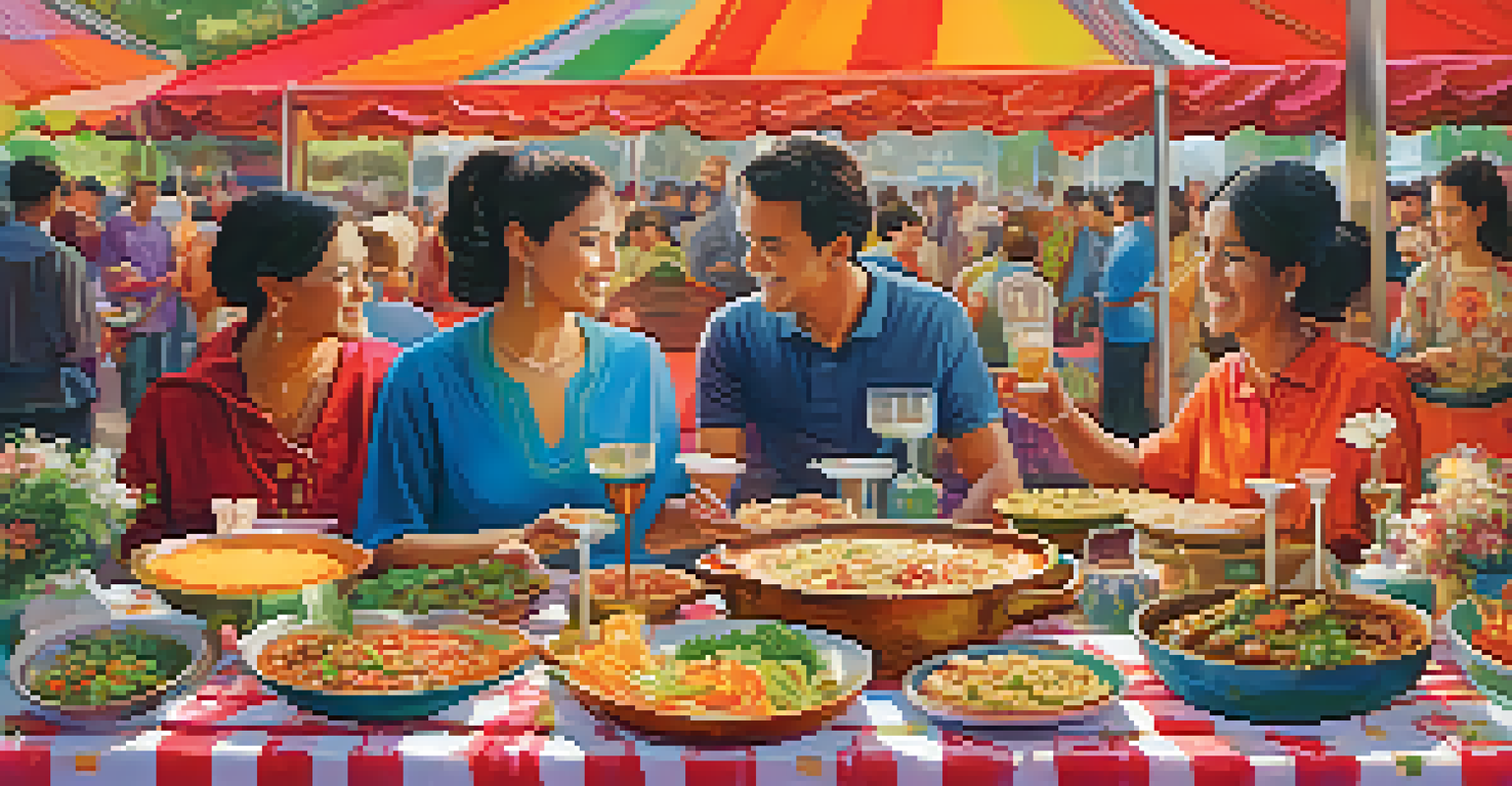Exploring the Importance of Cultural Exchange Festivals

Cultural Exchange Festivals: A Brief Overview
Cultural exchange festivals are vibrant events that celebrate the diversity of cultures around the world. They often feature music, dance, food, and art, showcasing the unique traditions and practices of different communities. These festivals serve as a platform for sharing ideas and fostering mutual respect among participants.
Culture is the widening of the mind and of the spirit.
From the colorful parades of the Carnival in Brazil to the serene beauty of the Lantern Festival in China, each festival tells a story. These events not only entertain but also educate attendees about the rich tapestry of global cultures. By bringing people together, they create opportunities for dialogue and interaction.
Overall, cultural exchange festivals play a crucial role in promoting cultural awareness and appreciation. They help bridge gaps between people from different backgrounds, making them essential for community building and social cohesion.
Promoting Unity Through Shared Experiences
One of the most powerful aspects of cultural exchange festivals is their ability to promote unity among diverse groups. When people come together to celebrate, they often find common ground, fostering a sense of belonging. This shared experience can break down barriers and challenge stereotypes, leading to greater understanding.

For instance, at food festivals, attendees can sample dishes from various cultures, sparking conversations about traditions and cooking methods. These interactions can create lasting friendships and networks that transcend cultural differences. People start to see each other as individuals rather than representatives of their cultures.
Cultural Festivals Boost Unity
Cultural exchange festivals foster unity among diverse groups by creating shared experiences that break down barriers and challenge stereotypes.
In essence, these shared experiences can transform perceptions and build bridges between communities. When individuals embrace diversity, they contribute to a more inclusive society that values every voice.
Economic Benefits of Cultural Festivals
Cultural exchange festivals are not just about celebrating diversity; they also offer significant economic benefits to local communities. They attract tourists, which can boost local businesses such as restaurants, hotels, and shops. By drawing in visitors, these festivals create jobs and stimulate economic growth.
Diversity is not about how we differ. Diversity is about embracing one another’s uniqueness.
For example, a well-attended music festival can lead to increased sales for nearby vendors and local artisans. These events can showcase local talent, encouraging attendees to explore more than just the festival itself. This ripple effect can have lasting impacts on the community's economy.
Moreover, the funds generated from these festivals can be reinvested into local projects, further enhancing community development. By supporting cultural exchange festivals, communities can experience a win-win situation: celebrating diversity while reaping economic rewards.
Cultural Preservation Through Festivals
Cultural exchange festivals play a vital role in preserving traditions and heritage. Many communities use these events to showcase their unique customs, arts, and languages, ensuring they are not forgotten. By highlighting these aspects, festivals help keep cultural identities alive for future generations.
For instance, traditional dance performances and art exhibitions can educate younger attendees about their heritage. This not only instills pride in one's culture but also encourages the transmission of knowledge and skills. As older generations share their stories, younger participants gain a deeper appreciation for their roots.
Economic Growth Through Festivals
These festivals not only celebrate diversity but also stimulate local economies by attracting tourists and supporting local businesses.
In this way, cultural festivals become a living archive of history and tradition. They remind us of the importance of honoring our past while embracing the future.
Fostering Global Citizenship and Understanding
Cultural exchange festivals encourage a sense of global citizenship among participants. By experiencing different cultures firsthand, individuals become more open-minded and empathetic. This exposure fosters understanding, which is crucial in today's interconnected world.
When people engage with diverse perspectives, they learn to appreciate the complexities of global issues. Festivals can spark conversations about topics such as climate change, migration, and social justice, encouraging attendees to think critically and act compassionately. This awareness can inspire collective action towards positive change.
Ultimately, these experiences cultivate a generation that values inclusivity and global collaboration. By fostering global citizenship, cultural exchange festivals contribute to a more harmonious world.
The Role of Technology in Cultural Festivals
In today's digital age, technology plays a significant role in enhancing cultural exchange festivals. Social media, live streaming, and virtual reality are just a few tools that help broaden the reach of these events. They allow people from different parts of the world to participate, even if they cannot attend in person.
For example, festivals can live-stream performances, enabling global audiences to enjoy the festivities. This not only increases visibility for artists and cultural groups but also allows for a more inclusive experience. It connects individuals across borders, creating a shared appreciation for cultural diversity.
Preserving Cultural Heritage
Cultural exchange festivals play a crucial role in preserving traditions and heritage, ensuring that unique customs and identities are passed down to future generations.
Moreover, technology can facilitate interactions between participants, fostering discussions and collaborations. By leveraging technology, cultural exchange festivals can evolve and adapt, ensuring their relevance in a rapidly changing world.
Challenges Facing Cultural Exchange Festivals
Despite their many benefits, cultural exchange festivals face several challenges that can hinder their success. Funding is often a significant concern, as many festivals rely on sponsorships and donations to operate. Without adequate financial support, festivals may struggle to maintain their quality and reach.
Additionally, logistical issues such as location, accessibility, and weather can impact attendance and overall experience. Organizers must carefully plan to create an inclusive environment that welcomes all participants. This often requires collaboration with local authorities and community groups.

Addressing these challenges is crucial for the sustainability of cultural exchange festivals. By finding innovative solutions and fostering partnerships, organizers can ensure these events continue to thrive and enrich communities.